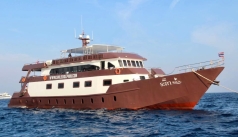The Climate and Best Time to Visit
Thailand is hot and tropical (27-29°C) throughout the year, with the hottest months being March to May and the monsoon winds dictating the rain patterns. In the Andaman Sea, the dry season runs from November to the end of April. This is the time when the seas are calmest and corresponds with the season for Thailand liveaboards. February to April is a particularly popular period since this is the prime time to see whale sharks and mantas in the area. Water temperature is usually 27-30°C through the year.
The Green season runs from May to October and this time sees the most rain, with the wettest month often being October. During this period (June to September) there are a number of liveaboard boats that run tours to the best of the Phuket and Phi Phi Island dive sites.
You can find more details on our Thailand diving destinations page.
Ports of Departure and How to Get There
Most visitors arrive in Bangkok, the capital of Thailand, and connect onwards on a domestic flight to Phuket but there are also a few international airlines that fly direct to the island. Flights to Phuket from Bangkok are frequent, take just over 1 hour, and are inexpensive. You can book with Air Asia, Thai Airways, Nok Air or Bangkok Airways among others. Other frequent and reliable flight options to consider include connections from Malaysia, Singapore and Bali.
Bangkok is one of the major travel hubs of South East Asia. There are flights there from most countries in Asia, as well as Europe, the Middle East and Australia. You can also get to Phuket (or Khao Lak) by bus or train from Bangkok. Fares are very cheap but the journey can be a long one (up to 12 hours).
We recommend you take out insurance to cover diving and travel activities, including trip cancellation. See our insurance programme for a competitive price:

Places to Stay
When planning accommodations for your Thailand liveaboard diving cruise, our trusted partner HotelsCombined.com offers the ideal solution with their comprehensive selection of hotels and resorts nationwide. Their platform makes trip planning effortless. Simply browse their extensive options, get real-time answers through their convenient online chat, and complete your secure booking with a credit card:

What's more, every reservation comes with their valuable 'Low Price Guarantee', protecting your budget by ensuring you always receive the most competitive rates available. Whether you need a convenient pre-departure hotel or a relaxing post-safari resort, HotelsCombined provides reliable booking with guaranteed value for your Thai diving holiday.





















